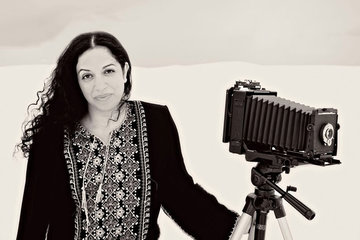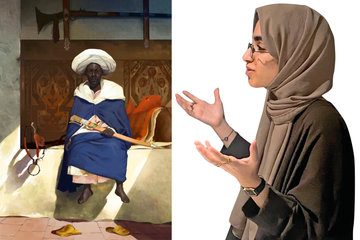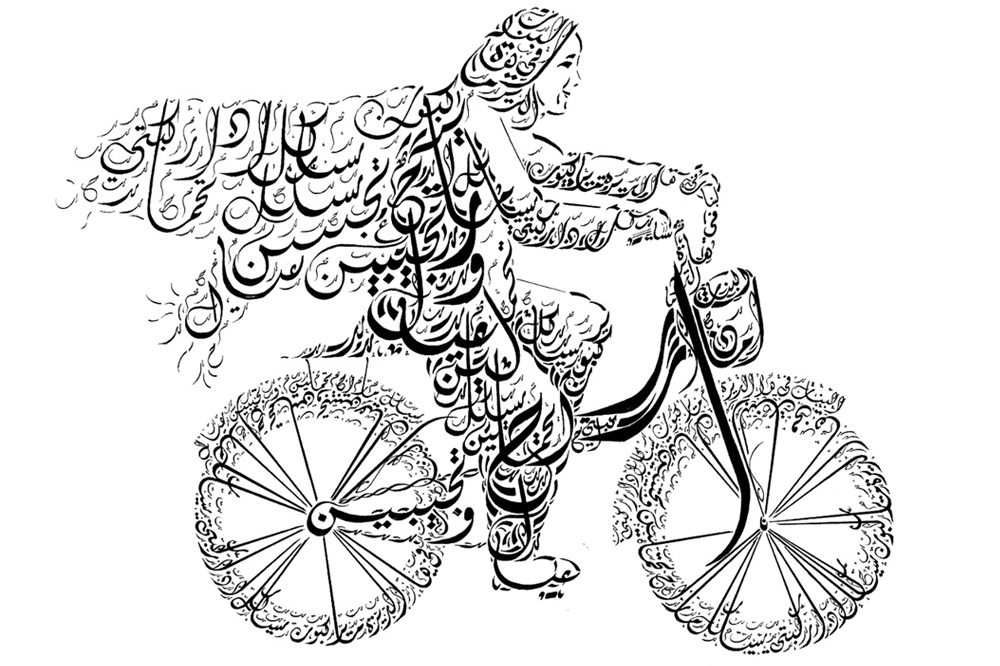
In 2009 and during his semester abroad in Damascus, American artist Everitte Barbee learned to write the Ruq’a, Diwani and Diwani Jali scripts from a master calligrapher named Adnan Farid.
Born in Nashville, Tennessee (USA) in 1988, Everitte later graduated from the University of Edinburgh in Scottland with a Masters in International Business and Arabic and then moved to Beirut to continue researching and developing his skills as a calligrapher and artist, as well as improving his Arabic. Although he had a passion for the arts from a young age, Everitte actually did not begin studying Arabic calligraphy until he travelled to the region.
Over the last years, Everitte has created a large number of works that span the religious, the sentimental, the poetic but also pop culture and personal statements that touch on his multifaceted background. Here is just an overview of these exciting pieces:
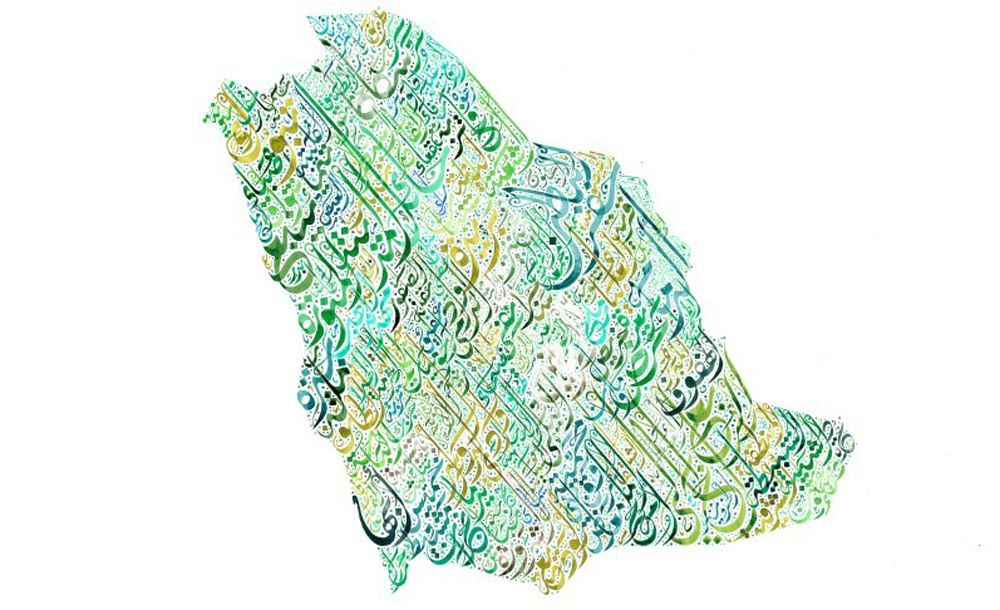
Map of Saudi Arabia
This map of Saudi Arabia is illustrated using the names of the country’s towns and cities and is written in the Diwani Jali script.
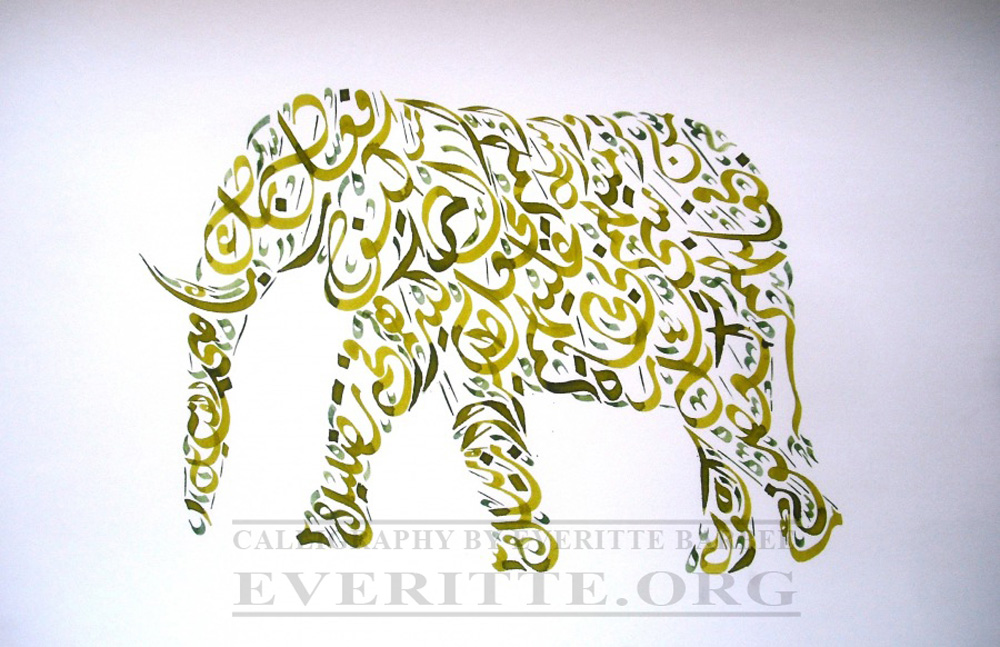
The Elephant
This piece is part of Everitte’s recent experiments with color, in this case using just his favorite green, the color of Islam. The elephant is formed entirely using only Arabic calligraphy in the ornamental Diwani Jali script. The text in this piece is the entire 105th book of the Qur’an. It is part of the artist’s ongoing project “The Quran for Solidarity.” This Surah, entitled “Al-Fil,” meaning “The Elephant” is composed of five verses, a translation of which can be seen below, courtesy of Sahih International.
105:1 Have you not considered, [O Muhammad], how your Lord dealt with the companions of the elephant?
105:2 Did He not make their plan into misguidance?
105:3 And He sent against them birds in flocks,
105:4 Striking them with stones of hard clay,
105:5 And He made them like eaten straw.
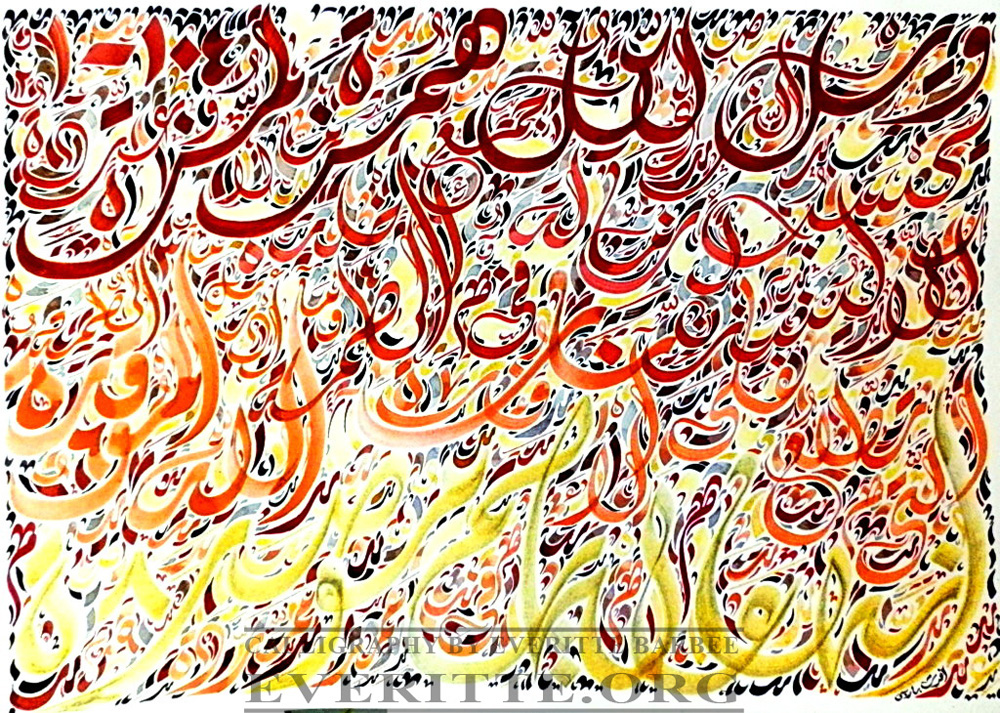
Surah 104 Al-Humazah
This piece is formed entirely using only Arabic calligraphy in the ornamental Diwani Jali script. The text in this piece is the entire 104th book of the Qur’an. It is part of Everitte’s ongoing project “The Quran for Solidarity.” This piece was recently featured in a solo exhibition of Everitte’s Qur’anic works at the embassy of the United States in Lebanon.
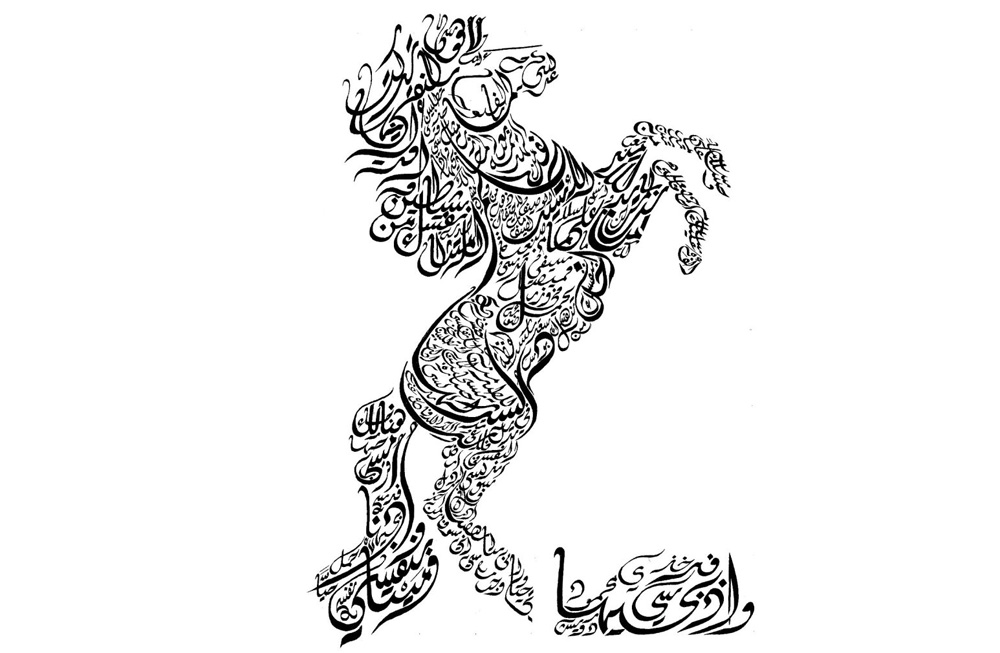
Horse
The image of a horse in this piece is created using only the Arabic text from the love poem "Take my Horse and Slaughter It" by Mahmoud Darwish. The text is written in the Diwani Jali script. Every word in the poem is used and no words are repeated. Darwish's name and the title of the poem form the design in the bottom right of the piece. Here is an English translation of the poem by Fady Joudah:
You, and not my craze with conquest, are my wedding.
I left to myself and its match in your devil self
the freedom to comply with your demands,
take my horse
and slaughter it,
and I will walk like a warrior after defeat
without dream or sense ...
Salaam upon what you desire of fatigue
for the captive prince, and of gold for the maidens
to celebrate the summer. And salaam upon you
abounding with suitors of every jinn and man,
for what you've done to yourself for
yourself: your hairpin breaks
my shield and my sword,
and your shirt button bears in its glare
the secret word of birds of every sort,
take my breath the way a guitar responds
to what you demand of the wind. All of my Andalus
is within your hands, so don't leave a single string
for self-defense in the land of my Andalus.
I will realize, in another time,
I will realize that I have won with my despair
and that I have found my life, over there
outside itself, near my past
take my horse
and slaughter it, and I will carry myself dead and alive,
by myself...
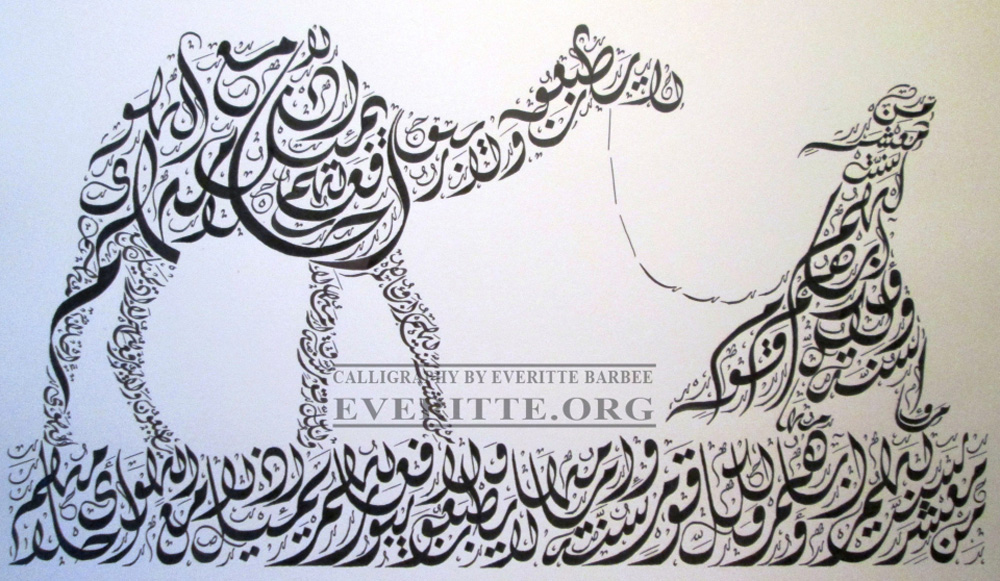
Ode of Labid
The two verses featuring this image are taken from Ode of Labid pre-islamic Moa’alkat and is written in the Diwani Jali script. A colored version of this piece was exhibited in Algeria at Moustafa Basha museum in 2013.
Noble we; our fathers wielded power bequeathed to them, dealt law to the nations, each tribe its lawgiver.
All our lineage faultless, no light words our promises; not for us the vain thoughts, passions of common men.
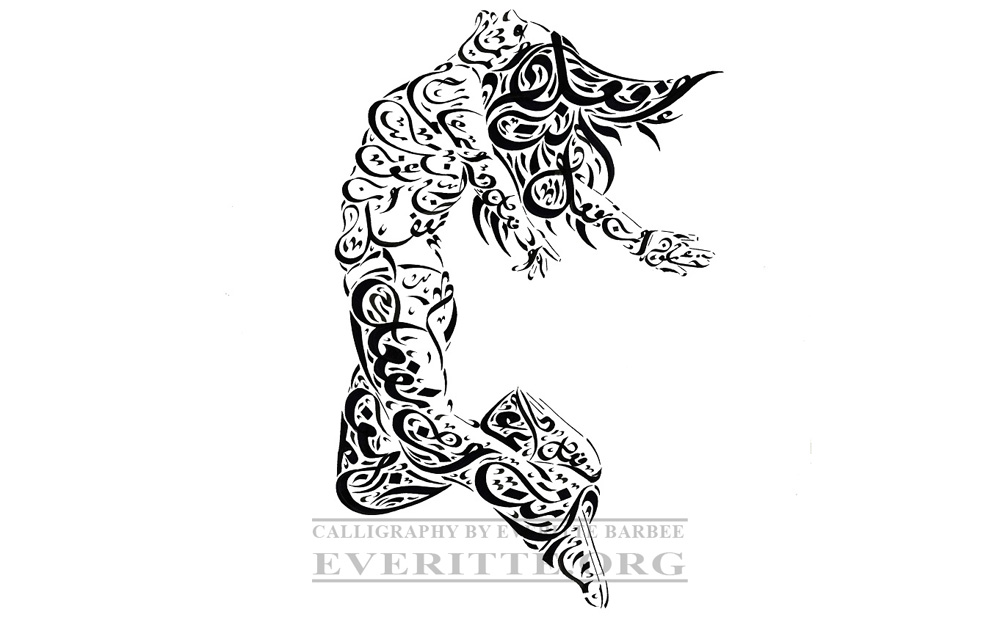
Take the Leap
The figure of a woman jumping is created using the Diwani Djali script. The text reads “Always do what you are afraid to do” and is repeated exactly three times and is meant to depict the shape of a woman conquering her fear.
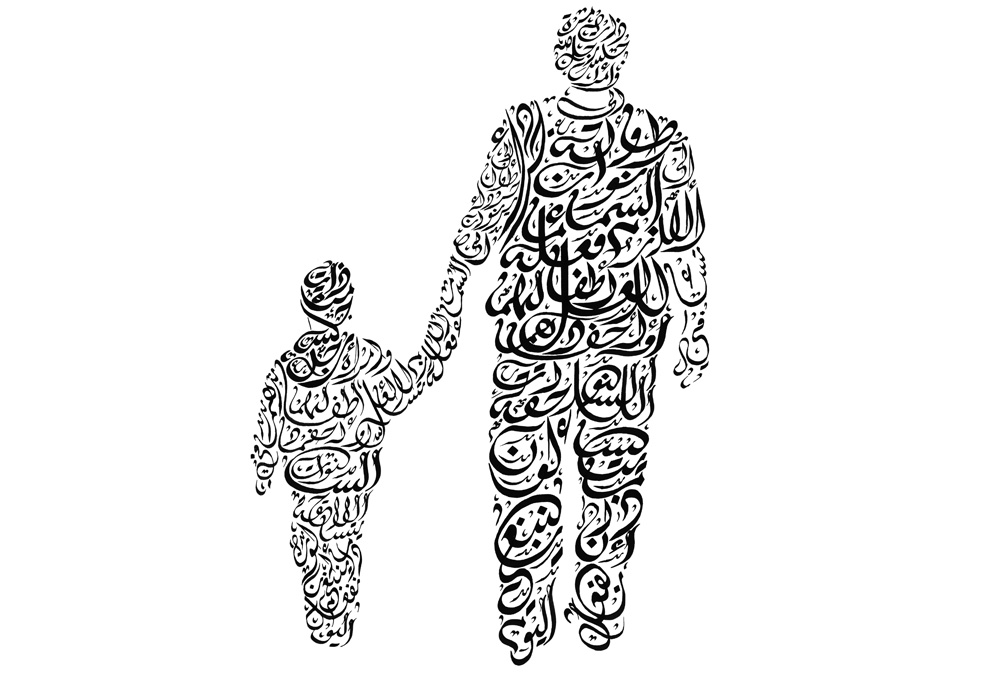
The Children Are Our Future
The poem “Untitled” by Scottish poet Tom Pow is written twice in the Diwani Jali Arabic calligraphy script to create the image of a man and child walking hand in hand. This piece was one of eight designs that was commissioned by Reels Festivals to accompany their poetry publication featuring contemporary poets from Lebanon, Syria, and Scotland. One piece was commissioned for each of the eight poets featured in the festival. In preparation for the festival, all of the poets travelled to Lebanon in order to translate each others poems from Arabic to English and vice versa and this is one of those recently translated poems.
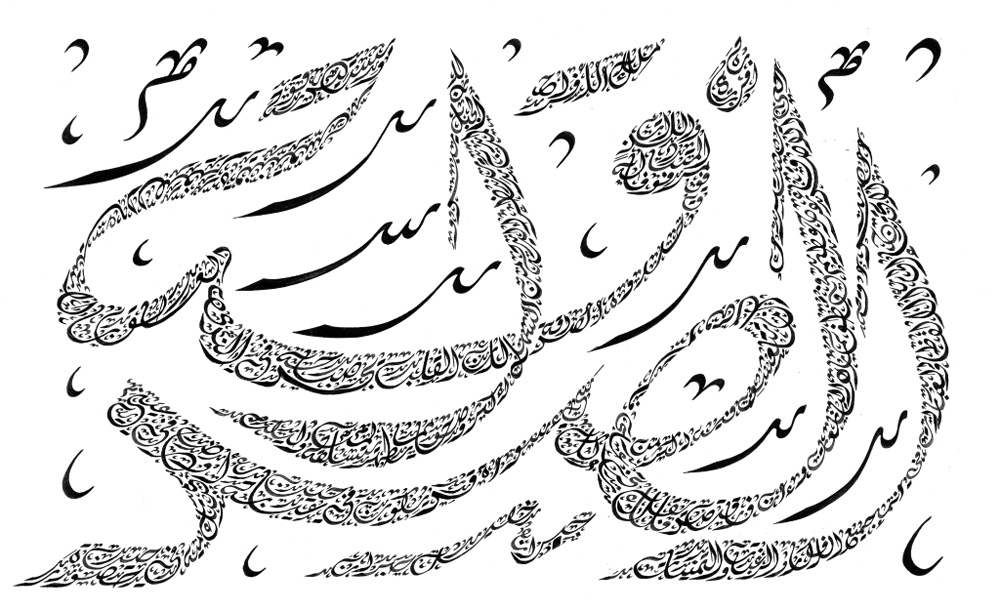
Gibran’s Friendship
Khalil Gibran eloquently describes friendship in his poem and this excerpt of his is written exactly once in the Diwani Jali Arabic calligraphy script to write the word “friendship” once again in large letters.
Without words, in friendship, all thoughts, all desires, all expectations are born and shared, with joy that is unacclaimed.
When you part from your friend, you grieve not;
For that which you love most in him may be clearer in his absence, as the mountain to the climber is clearer from the plain.
And in the sweetness of friendship let there be laughter, and sharing of pleasures.
For in the dew of little things the heart finds its morning and is refreshed.
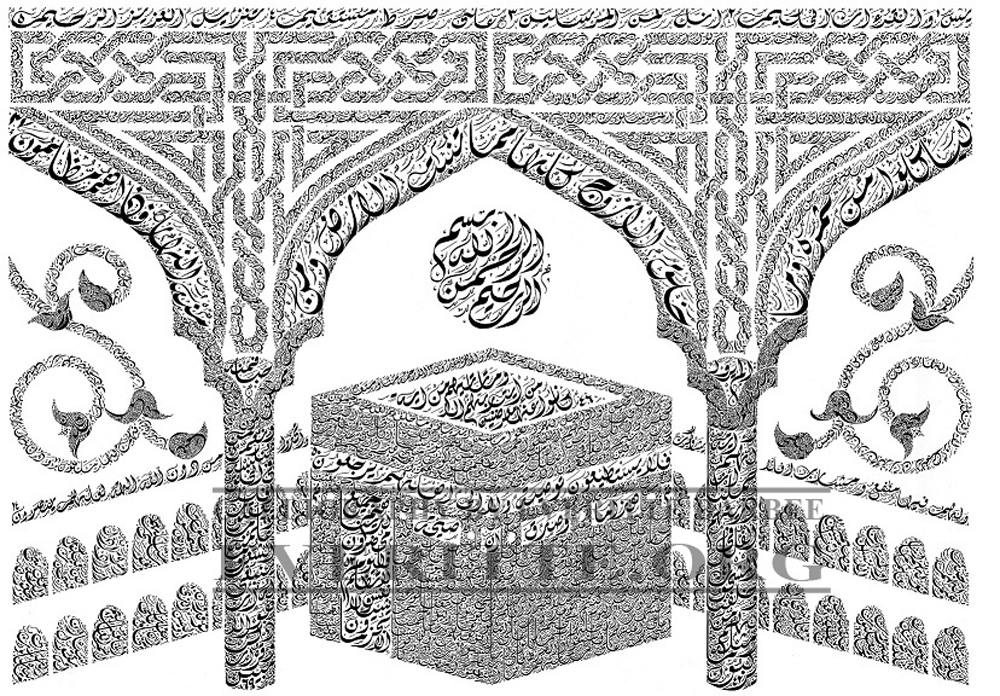
Surah 36 Ya-Sin
This piece is formed entirely using only Arabic calligraphy in the ornamental Diwani Jali script. The text in this piece is the entire 36th book of the Qur’an. It is part of Everitte’s ongoing project ‘The Quran for Solidarity‘.
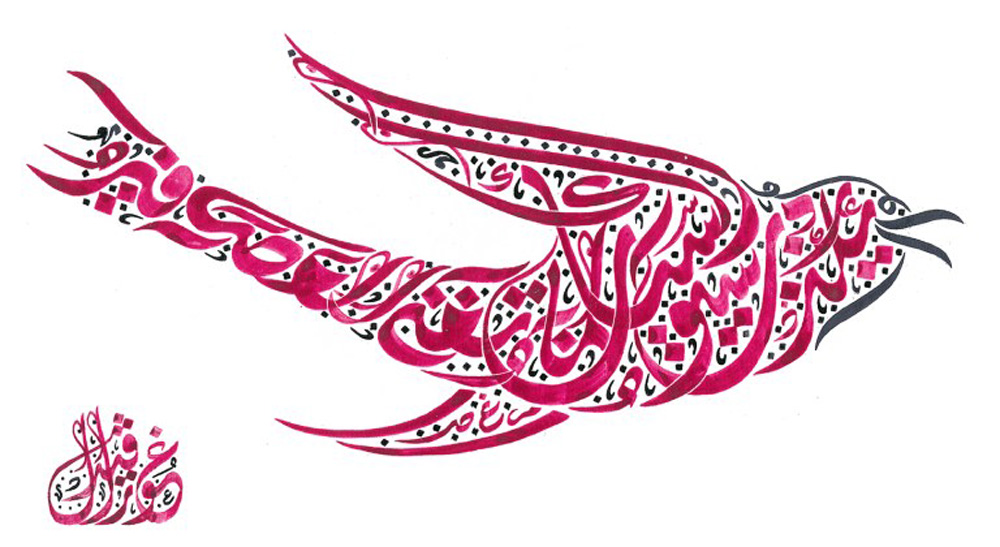
“Politicians lie in the same way a Bird sings”- Gore Vidal (1925-2012)
The quote is written once in the Jali Diwani Arabic calligraphy script to illustrate the form of a bird. The authors name is written in the lower left corner. Gore Vidal was a renowned author, political analyst and World War Two veteran. Born into a prominent politically aristocratic family, he was a cousin of both Jimmy Carter and Al Gore as well as a close friend of JFK.
Everitte Barbee’s work is created using only the Diwani Jali script but he hopes to incorporate other scripts at some point. The artist’s calligraphy has been exhibited in different countries around the world, including the UAE, Saudi Arabia, Algeria, the UK, Lebanon, and Bahrain. Some of these images were created a few years back and others are from very recently – and there’s no chance of him slowing down! Keep an eye on this talent from the US who is bridging the gap between cultures through his art and his dedication to Arabic calligraphy.


